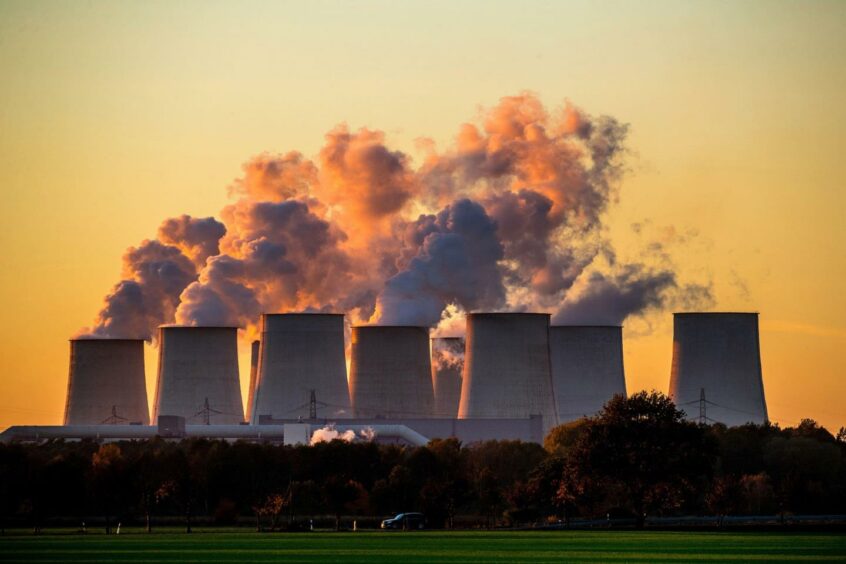
A first draft of a deal for COP26 calls on countries to strengthen their emissions-cutting plans in the next year in a bid to keep a goal to limit warming to 1.5C within reach.
It also calls for faster phasing out of coal and subsidies for fossil fuels – a first for a UN deal – but there is likely to be strong resistance to this from some countries and it could be taken out of any final agreement.
Developing countries and campaigners have also raised concerns over the provision of finance for poorer nations to cope with the impact of climate change in the draft deal.
The draft “cover decision”, the final version of which must be agreed by consensus of nearly 200 countries at the Glasgow summit, was published on Wednesday, as Prime Minister Boris Johnson headed back to the talks as they entered their final days.
Scientists have warned that keeping temperature rises to 1.5C, beyond which the worst impacts of climate change will be felt, requires global emissions to be cut by 45% by 2030, and to zero overall by mid-century – but countries’ plans for this decade leave the world well off track.
The draft is published after analysis warned existing plans for this decade put the world on track for 2.4C of warming – well above the goals internationally agreed in the Paris accord to curb temperature rises to “well below” 2C and try to limit them to 1.5C.
COP26 president Alok Sharma has made it clear that there is no attempt to renegotiate the Paris Agreement, but the draft document says the impact of climate change will be much lower with 1.5C of warming than 2C.
And it “resolves to pursue efforts to limit temperature rises to 1.5C” which will require more action in this decade.
The draft urges countries to “revisit and strengthen” the targets for cutting emissions by 2030 in their national plans to align them with the Paris temperature goal, which still covers both numbers, by the end of 2022.
The document published on Wednesday also urges countries to set out long-term strategies by the end of next year to reach net-zero emissions by about mid-century.
It includes a call for developed countries to at least double their collective provision of climate finance to help developing countries adapt to climate change, as part of scaling up finance for poorer nations to tackle the crisis.
There is also a recognition of the need to do more to address the inevitable loss and damage to people, livelihoods, land and infrastructure in developing countries that more extreme weather will bring.
Delegations are expected to be in contact with their leaders and capitals to discuss what their position will be – particularly in those countries whose leaders did not attend the summit, such as China and Russia.
Some of the most vulnerable countries have called for more action on finance, and warned that the language in the text is not strong enough to prevent dangerous warming.
The Alliance of Small Island States group’s chairman, Aubrey Webson, said: “We won’t get the ambition on emissions we need for 1.5C if we don’t scale up the provision of finance, and this includes the long-overdue recognition of a separate and additional component for loss and damage.”
He said: “Urging, calling, encouraging and inviting is not the decisive language that this moment calls for.
“We have limited time left in the COP to get this right and send a clear message to our children, and the most vulnerable communities, that we hear you and we are taking this crisis seriously.”
Environmental campaigners criticised the draft deal, with Greenpeace International executive director Jennifer Morgan saying it was “not a plan to solve the climate crisis”.
“It’s a polite request that countries maybe, possibly, do more next year,” she said.
Christian Aid’s Kat Kramer said it was a “historic moment” with the first outlines of the phase-out of coal and fossil fuel subsidies, but said there was lots of work to be done on finance for poorer countries.
Bob Ward, from Grantham Research Institute on Climate Change and the Environment at the London School of Economics, said: “This draft includes all the key elements of a successful outcome, but there needs to be more ambition and more precision.
“We need countries to agree to return every one or two years with more ambitious pledges. We also need stronger evidence of action to deliver the pledges.”
Alongside the political decision, negotiators are also trying to hammer out agreement on technical parts of the Paris Agreement, including common timeframes for national commitments on emissions reductions and agreed ways for countries to report on their progress, to help turn pledges into action.
There are also negotiations on providing adaptation finance and to address the issue of loss and damage.
Mr Johnson spoke to Mohammed bin Salman, crown prince of Saudi Arabia, a country which has been accused of blocking progress at the climate summit, while en route to COP26.
A Downing Street spokesman said: “He welcomed Saudi Arabia’s commitment to reach net zero by 2060 and their efforts to transition away from fossil fuels.
“They discussed the importance of making progress in negotiations in the final days of COP26, including on finalising the outstanding elements of the Paris Rulebook.”
Recommended for you
